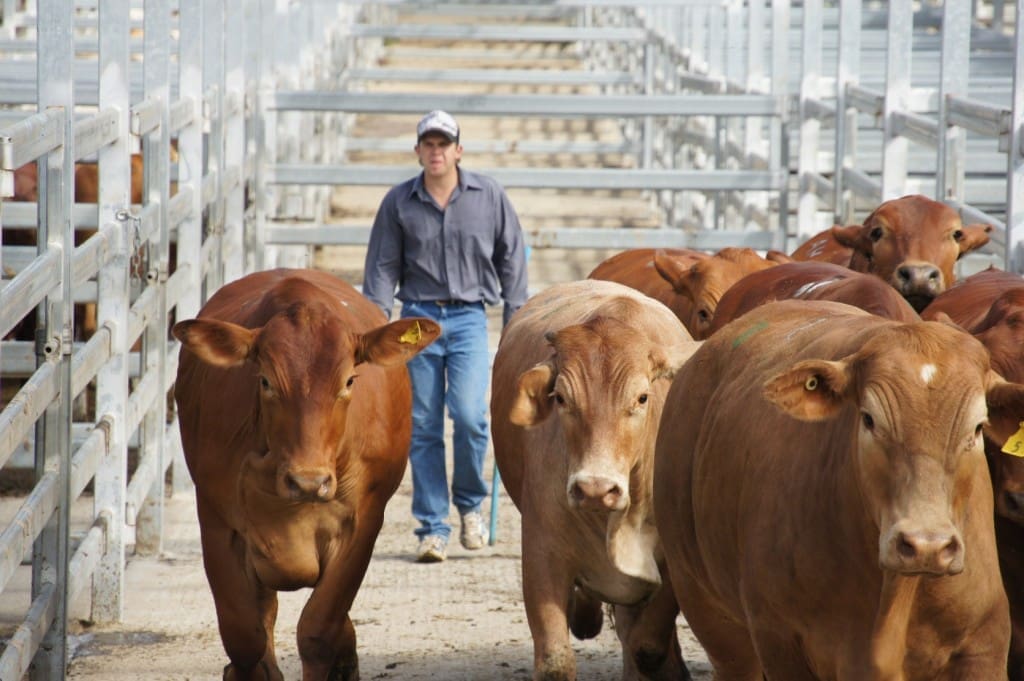
“IF it ain’t broke, don’t fix it”, the famous last words of failure, and an archaic slogan is terrible advice when it comes to business today.
At the rate of change that is ever increasing, old adages like this can’t apply when we consider business sustainability, and parts of the agriculture sector in particular are in the firing line, primed for disruption.
Quite simply, free markets reward efficiency, so as margins tighten it’s no surprise that the savvy operators and early adopters are turning to tech to drive greater efficiencies and cost savings across their farming operation.
Take the role of livestock agents for example; they have one of the oldest jobs in agribusiness….but is their use-by date fast approaching?
For decades, they’ve been charging farmers upwards of three to five percent for two main functions; marketing, and payment guarantee. So it shouldn’t come as a shock that when there’s that fat up for grabs and market share is owned by an incumbent model that’s not moving, we’re seeing startups take aim and fire.
 One of these is Stocka; an Agri-fintech startup that offers a secure and low cost livestock, grain and hay trading payment solution. Stocka was founded by Kelsey Miller and it enables farmers to guarantee payments from processors and feedlots, without needing a stock agent, for a mere 1.25pc commission rate. On top of that, if you want your money in two days from when the animals leave the farm you can get it, and they also offer Stocka Transit which covers any loss of livestock from loading through to delivery for only 0.5pc.
One of these is Stocka; an Agri-fintech startup that offers a secure and low cost livestock, grain and hay trading payment solution. Stocka was founded by Kelsey Miller and it enables farmers to guarantee payments from processors and feedlots, without needing a stock agent, for a mere 1.25pc commission rate. On top of that, if you want your money in two days from when the animals leave the farm you can get it, and they also offer Stocka Transit which covers any loss of livestock from loading through to delivery for only 0.5pc.
Kelsey came up with the idea while working on the family farm with his father and brother. They were looking to scale up, and after realising the business couldn’t really afford to take the 4+pc stock agent commission hit time and time again, he was eager to find a cost efficient solution- and was happy for the business to manage the marketing aspect.
“My research indicates that for a lot of farmers, the payment guarantee is a really important part of the reason they use an agent. And interestingly, a lot of the producers I speak to are really only selling to a couple of different processors or feedlots, so it’s not like they’re selling to 5 or 10, the vast majority are doing one or two.” Kelsey said.
Other startups will compete for margins in the marketing of commodities using simple and proven marketplace technology that has been around for 15 years. Fintech (financial technology) is already everywhere, managing and facilitating transactions, escrow, insurance and contracts we all use every day.
So competition is coming, and we know that competition makes prices go down and quality of product or services go up. Perfect conditions for a lean, fast and aggressive startup. So bring it on!
From a marketplace perspective, agriculture is still a far cry from sophisticated. Online marketplaces that use star-ratings to ensure quality of users/traders are tried and tested. Ebay, AirBnB and Uber are the cliched examples that come to mind.
But they’ve smashed long-standing and traditional practices that didn’t move. When farmers get over their strange obsession of wanting to pay for and/or use a third party physical assessment, just like the rest of the world has with many other marketplaces, the stock agent model is in trouble.
Alternatively, we could all wait for digital measurement tools like iot and robotic scanning devices that physically scan animals to provide guarantee of size, weight, or condition for the buyer; but we’re a long way off that tech pipedream!
Takeaway
So what’s the take away?
Stay tuned. Traditional models and jobs across the sector will increasingly come under threat, especially as tech gets better, cheaper and farmers become more open to new ways of doing business. After all, when there’s upwards of 3pc savings to be made, it won’t be long before the market starts rewarding providers that give them more bang for their buck.
About Sam Trethewey
 Sam Trethewey is from a farming family and has worked across Australia and overseas on most major commodities including beef, wool, lamb and cropping. He co-founded SproutX, Australia’s first and largest agtech accelerator and investment fund where he spent nearly three years developing an ecosystem of support for agtech startups. He has been a regular commentator on agriculture through print, radio and online and has recently started his own food production company whilst also working as Head of Brand for Redhanded, a rural and regional communications specialist.
Sam Trethewey is from a farming family and has worked across Australia and overseas on most major commodities including beef, wool, lamb and cropping. He co-founded SproutX, Australia’s first and largest agtech accelerator and investment fund where he spent nearly three years developing an ecosystem of support for agtech startups. He has been a regular commentator on agriculture through print, radio and online and has recently started his own food production company whilst also working as Head of Brand for Redhanded, a rural and regional communications specialist.
Questions? If you’ve got an agtech topic you’d like Sam to tackle, please email sam@beefcentral.com.au

Hi Sam,
Interesting article but I don’t agree at all. My stock agent is the most important person in my farming business, his knowledge is second to none and when times are tough like they are now his ideas and direction are key to our success. I look to my stock agent as a wealth creator and someone who is working with me to grow my business. I’m more than happy to pay my commission for his buying and selling experience. Also at the end of the day my agent is a good mate, and with the season being tough for all of us I’d rather talk to a mate in the yards than a computer in the office. Regards Anthony.
Hi Sam, StockX is our kiwi version. It has taken time for farmers to trust this model over the ingrained historical farmer stock agent relationship.
Cost of production is king in any beef business. Hard to ignore an opportunity of savings at that magnitude. When times are tough money in the farmers pocket is good for the farmer and good for the community when they spend it.
Yep great one dimensional article!
Look I’ve been a stock agent for over thirty years and I will be the first to admit agents commission is not cheap but to suggest an agents role is nothing more than to book stock in over a grid is farcical.
An agent / client relationship is one of the closest business relationships I know of and can be involved in almost every aspect of both business and personal life.
To say an agent – a good one – brings nothing to the table to justify his or hers commission is just plain wrong. I can think of any number of examples where I have seen a producer book stock or sell property by passing an agent soley motivated to avoid the commission and cost themselves way more.
I agree no one deserves a free ride in this world and agents are no different. If your agent doesn’t justify his existence get another one. To say a settling service charging not far short of half commission is a earth shattering disruptor is not quite on the mark either!
Fantastic technology developments coming to agriculture & livestock sector and yes, they will be disruptive, but many will add value through productivity and efficiency gains. As history has shown (Kodak comes to mind), all existing firms will have a choice and decisions to make, regarding the future impact/threat of technology on their current business model. Ultimately the client & consumer decides what represents value and chooses with their feet and wallet. In my opinion, the ticket clipping days in agriculture and livestock in particular, are under threat and new service offerings by firms & people with different skills will be required in the future. Adaption to the environment is the key to survival and there may well be some more ‘Kodak’ companies on the roadside. Realistically, not all new Agtech companies are guaranteed of their future unless they solve a problem or need that creates value for clients & consumers.
Interesting and exciting times ahead for Australian agriculture and livestock.
Great article. AuctionsPlus is an interesting example of an innovative company that is retaining the agent model (or at least, some aspect of it). But when you’re paying agents upwards of $60 per animal to sell to feedlots/abattoirs it becomes an expense that is very hard to justify indeed. Particularly when it’s becoming easier and easier to circumvent agents, by going direct to buyers. Using sites like Spotbooked to get feedlot quotes or even just becoming members of Facebook groups like “Cattle Grids Australia” to get abattoir prices, agents will really have to adapt to show their value.
It hasn’t been uncommon for Stock Agents in the past to charge low commission rates similar to this for abattoir bookings. I actually think it is the current internet marketing method (and Agencies’ share of income from this) that is under threat from disruptive technology in animal measurment, vendor payment and new bidding systems software emerges into the market place.
Hi Sam like to have a yarn to you about small business in country towns struggling at the moment regards david